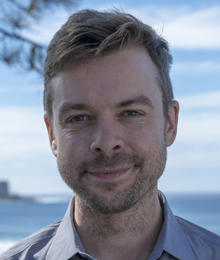An interview with Professor Jack Gilbert
February 2020
Jack Gilbert is a Professor at the University of California San Diego and Co-Founder and President of BiomeSense. He is also a member of the Microbiology Society, and in this interview tells us more about his current research as well as his contributions to form collaborative relationships through various projects.

How did microbiology evolve into an area of research that matters?
Why did people start looking into the invisible world? Van Leeuwenhoek was just exploring, discovering for discoveries sake, when he stumbled upon microbes, but as with all discoveries, humanity quickly (within 150 years) figured out that these invisible worlds were the cause of much human suffering.
The pioneering work of Lister, Pasteur and Koch in the 19th century demonstrated that mastery over microbial disease was possible, and that it could revolutionise society. The over-riding successes of microbiology in the last 150 years have been vaccines and antibiotics, and with them, our ability to prevent death on an unprecedented scale.
So where does that leave the next 150 years and beyond?
Merging microbiology and ecology started very shortly after the discovery of the microbial world and has only increased in importance as a field. Microbial ecology, and its latest incarnation of microbiome science, is revolutionising medicine, agriculture, industry, environmental protection, and even space travel.
I hope I contributed to this by continuing the tradition of discovery; the Earth Microbiome Project, founded in 2010, has provided standard protocols and data resources that have altered the microbial research landscape by creating a community of collaboration and sharing. It has also enabled me to explore the impact of microbial ecology across fields.
Tell us more about your research
Currently my lab is exploring ways to prevent the development of asthma, developing probiotics to treat depression, controlling the spread of antimicrobial resistance in buildings and even spacecraft, developing microbial consortia to strengthen mangroves against anthropogenic stress, tracking the source of microbial pollution in urban rivers, developing novel solutions for industrial processes, and even improving the cognitive function of working animals such as dolphins, to name but a few.
Why does the impact of climate change matter to microbiology?
The impact of climate change is terrifying and should scare everyone to do whatever they can to mitigate the fallout. I believe that in 150 years we will look back and hail our efforts to uncover new ways in which microbiology can buffer or reverse our catastrophic influence on global climate as being the epitome of importance. It is an exciting time to be a microbiologist, but the stakes have never been higher, and we need microbial science and scientists more now than ever before.


